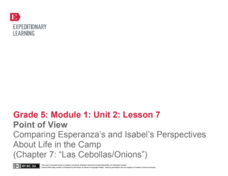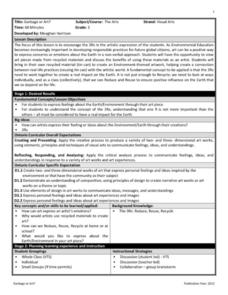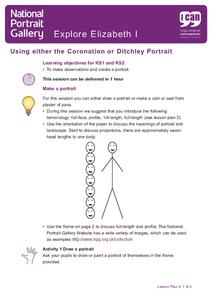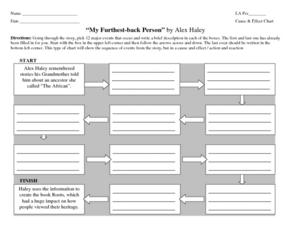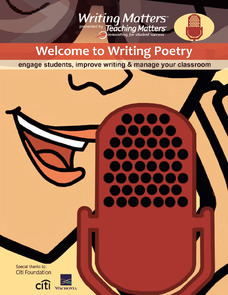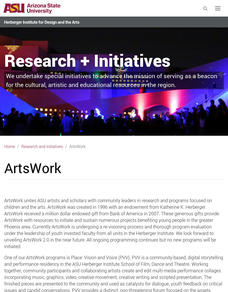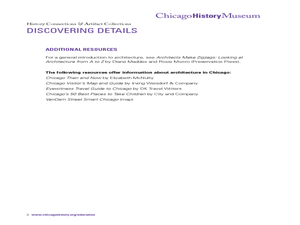Curated OER
A Separate Peace: Chapter 9 Reading And Study Guide
Pupils define 3 vocabulary words, define 1 literary term, and respond to 10 short-answer questions pertaining to chapter 9 of A Separate Peace by John Knowles. These activities are designed to help them better understand the novel and...
EngageNY
Point of View: Comparing Esperanza's and Isabel's Perspectives About Life in the Camp (Chapter 7: "Las Cebollas/Onions")
Explore point of view and more with a Common Core-designed instructional activity. Learners experience different points of view by representing one of two characters from Esperanza Rising during a partner discussion. They must use...
Curated OER
Garbage or Art?
The three R's are, reduce, reuse, and recycle. Third graders use recycled materials to design and create an environmentally themed piece of art. They discuss and examine major art works that were created using recycled materials, then...
Shoop English
Literature Terms Activity
Designed to be used with an independent reading book, this activity provides practice with identifying and explaining literary terms. While they read, individuals find instances of literary devices and elements in use in their books....
Scholastic
Choose Your Words Wisely (Grades 9-12)
Words, words, words. The function of words in persuasive writing is the focus of a group activity that asks members to analyze how words advertisers use are designed to influence targeted audiences.
National Portrait Gallery (UK)
Explore Elizabeth I
Keen observation skills are an essential trait for good artists. Discuss the elements of a portrait with your class using terminology such as, full-face, profile, quarter-length, full-length. After that, they can use the included...
Curated OER
Of Mice and Men: Chapter 3 Reading and Study Guide
Boost comprehension with an excellent reading guide for chapter 3 Of Mice and Men. Learners define four vocabulary words, note one allusion, define five literary terms, and respond to 31 short answer questions regarding the Steinbeck...
Curated OER
Cause & Effect Chart: "My Furthest-Back Person" by Alex Haley
Help your class see the connection between events in Alex Haley's story "My Furthest-Back Person" with this awesome graphic organizer. Individuals write a brief description of 10 major plot events in a series of boxes. The first and last...
Houghton Mifflin Harcourt
Let’s Count!: Challenge Activities (Theme 5)
Challenge young scholars with a counting-themed series of activities. Your counters will write invitations to a feast, create books about dinner parties and animals, design posters, draw pictures of their favorite peaceful places, and...
Teaching Matters
Welcome to Writing Poetry
Your pupils are poets, and now they'll be able to show it with the exercises in this packet. The lessons, designed for beginner, intermediate, and experienced poets, not only feature a variety of poetic forms, but take learners through...
Curated OER
Communicating Feelings through
Sixth graders use subjects, themes, and symbols to communicate meaning in their own works of art. They describe the origins of specific images and ideas and explain why they are of value in their artwork and in the work of others.
Curated OER
Creating Plays from Children's Stories
Students explain how individual elements (e.g., plot, theme, character, conflict, etc.) comprise the structure of a play. They write an original one-act play with developed characters, specific setting, conflict, and resolution.
Curated OER
4-H Line & Design Activity Page
What a great activity for students. This 4-H activity sheet has students organize their bedroom, and make clothing, focusing on line and design.
Curated OER
Rhytym in Interior Design
Students demonstrate the use of rhythm in interior design. They create a sample page showing five different elements of rhythm as it is used in visual art. These elements include: repetition, gradation, transition,
opposition, and...
Curated OER
Rhythm and Art: Rhythm Collage
Students create a collage in response to musical rhythm. In this visual arts lesson plan, students will better understand the connection between visual arts and musical rhythm. Students will follow the teacher's model of letting the...
J. Paul Getty Trust
Expressing Emotions through Art Lesson 4—Everybody Celebrates
Students create a celebratory hat after viewing images of artwork depicting people celebrating an event. In this artistic perception lesson plan, students discover why people celebrate their accomplishments and how to express feelings...
Curated OER
Color Scheme Design
High schoolers create a work of art using specific color scheme guidelines studied previously. State standards for the arts are addressed in this six day lesson for the high school art class.
Curated OER
Designing Carousels
Learners design a carousel for an amusement park. In collaborative groups they conduct research, develop a presentation, write a descriptive paragraph, evaluate design features, and draw an artistic rendering of their carousel.
Curated OER
A Matter of Style Activity: Furniture Design
Students study the six styles of nineteenth-century furniture. They select their favorite style, then use three design elements from this style and sketch an idea for a piece of furniture.
Dick Blick Art Materials
Insoluble Paintings
Insolubility and density? Yup, it's art class, of course. To create insoluble paintings that continually move and change, kids mix water-based paint with mineral oil and seal the mixture in laminating pouches.
Curated OER
Discovering Details: Shoebox Designs
Students investigate architectural art by creating an interior design for a box. In this art design lesson, students analyze modern artifacts such as doorknobs, brackets and mailboxes by using a Venn diagram to identify similarities and...
Curated OER
3-D Design - Painting
High schoolers explain elements of relief sculpture. They create a sculpture from foam. They identify characteristics of the art of Clayton Pond and Pop Art. They develop skills in working with color.
Curated OER
Art of Japan - Textiles - Kimonos
Students examine and discuss the role of the Kimono in Japanese culture. They create Kimono Paper Weavings, Kimono Scratch Art, and Kimono Clay Sculptures.
Curated OER
Keeping Us in Stitches Activity: Crazy-Quilt Collage Design
Students create collages using the irregular-shaped and sized pieces, decorative stitching, and applied or painted motifs that reflect the Crazy-Quilt style, and explain how and why their design fits into that style.



